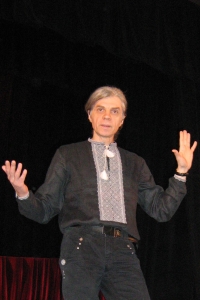“The main event that happened, as I mentioned, was the collapse of the Soviet Union. That was the primary event. Then everything began. This happened not only in Ukraine but everywhere. That’s why the event of 1991 was crucial. It was perceived as if it were a matter of course, calmly, and that’s how I saw it. There wasn’t a ‘wow’ factor; it felt like it was the right thing, a logical progression. We continued working the way we had started in the late 1980s, just the same. That’s how it was in Donetsk. Why was it like that? On one hand, it was wrong. Where was it wrong from where I’m standing now? If we had gained independence in 1991, the state and others should have focused more on Ukrainian culture, and invested more in this region. There should have been a cultural campaign. More should have been invested in this region; there should have been some kind of a cultural assault. But at the time, there was no such feeling there, none of that. We just continued with the Russian repertoire, the classic Russian repertoire, nothing new. Such an event didn’t happen. For me personally, the significant event of the 1990s was me, again, not from the top but personally. I went to Lviv. <…> In the mid-1990s, I went to Lviv. There was a theater festival there, and just the atmosphere, the place, the city; all of this scenery, where I place myself, my plays, my life. I know, but I left, and a few others left as well. But what about the majority of people? They know nothing about this... They’re staying there... To be honest, very few people went to Lviv, a bit to Kyiv, but to Lviv?... So I knew. Although I was raised in Russian culture, it struck me that I am still... Lviv is Europe... You know, I'm like Ilya Repin. They say Repin was from Ukraine. Do you know that Repin is Russian? He’s considered a Russian artist who painted many famous works, and a member of the Peredvyzhnyki art movement. But he also painted ‘Reply of the Zaporozhian Cossacks,’ which is a famous painting. But later, I found out that he painted many Ukrainian paintings, and nobody talks about it. ‘Hopak’ was his last work, and before that, he had many Ukrainian-themed paintings. Towards the end of his life, he considered himself Ukrainian. He separated, and lived in Finland in Kuokkala; it was easier for him there. He was, essentially, a Ukrainian artist. But for me, like Repin... Maybe it happened earlier with [Ilya] Repin? It began to dawn on me in the 2000s that something needed to be done about this region... True, it was already late. But it’s never too late, anyway. So, the event of the 2000s that somewhat pushed me towards this, and made me think about it even more, was the revolution. The Orange Revolution in 2004. I was in Kyiv at that time, by the way. It made a much greater impression on me than any other event... It was just a bomb... I believe there have been few revolutions like that, or I don’t know of any other revolutions... You don’t just know about it. When I was studying there, I was involved in directing, finishing my directing degree, and I lived there... Such a bloodless revolution, you could say, that’s how you could describe it, completely bloodless... People still don’t believe in it. Perhaps other nations do not believe that it could be like that. And Russia, they have a different worldview, a different perspective; they’re entirely different. They don’t understand that it could happen. But it did happen, and it wasn’t scary to go anywhere, day or night. You could enter anywhere. You could walk into theaters, doors were open, and you could watch performances.”


